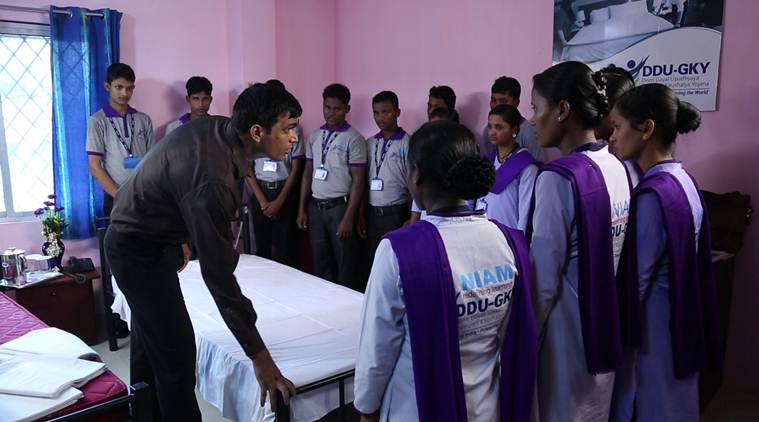- India
- International
In Odisha, how a jobs revolution is giving rural poor a fresh start
Odisha’s skilling programme begins with frequent visits to rural areas to inform the youth about the DDU-GKY and encourage enrolment.
 Skill training workshop in Odisha. (Express photo)
Skill training workshop in Odisha. (Express photo)
It took Poonam Kumari three months to turn her life around from an unemployed high school graduate to an internationally awarded coffee ‘brew-master’. And it started when her father, a truck driver, decided to move his family to Odisha from Bokaro in Jharkhand.
In Khordha district’s Jatni, she heard about the state government’s skill programme under the Deen Dayal Upadhyaya Grameen Kaushal Yojana (DDU-GKY). She trained for three months in 2015 in coffee making and currently earns Rs 20,000 a month at a Café Coffee Day in Thane. Mother to a ten-month-old baby, she plans to enrol all her four siblings in Odisha’s skill development centres under DDU-GKY.
A 2014 rural youth employment scheme under the Ministry of Rural Development (MoRD), the DDU-GKY has been spearheading a quiet revolution in Odisha. Poonam is one example among thousands whose skill development has helped the state win the best performer under DDU-GKY for two years in a row.
Last week, the Odisha Rural Development and Marketing Society (ORMAS), which oversees the scheme, was invited by the Centre to be the first National Resource Organisation (NRO) for skills.
Official data show that Odisha by 2017-18 trained 71,179 BPL rural youth over three years, of which 53,819 have been placed with different industries. In April, Odisha was declared the best-performing state in the DDU-GKY for the same year among all states except “north-east and hilly region”.

According to B N Das, Executive Director of ORMAS, which functions under Odisha’s Panchayati Raj department, youth trained and placed in Odisha were highest among all states, accounting for 25 per cent of the national target.
“We are also the first state to have a full software tracking system for DDU-GKY implementation that monitors every aspect from attendance during training and tracking candidates for up to one year after placement,” he says.
Odisha’s success is now being studied by other states as well. While a team from Bihar will visit Monday, a team from Rajasthan had come to Odisha to study the nuances in the implementation of the scheme.
Speaking to The Indian Express, Poonam says, “In Odisha, I was trained to become a coffee brewmaster. I learnt how to differentiate a latte from a cappuccino. I studied milk texturing and designs on foam.”
A solid grip on her trade-craft brought Poonam not just financial independence, but international recognition. “In 2017, I stood first in an international coffee making contest among brew-masters from 32 countries hosted in Mexico”, Poonam says proudly. “I was chosen to represent India after winning the national contest, which came with a cash award of Rs 40,000”.
Incidentally, young women made up 51 per cent of this group of trainees and 61 per cent belonged to SC, ST and minority communities (until 2017-18), according to the Odisha government. These young men and women now earn salaries between Rs 20,000 and Rs 35,000 in India and Rs 40,000- Rs 64,000 if employed abroad.
Behind Odisha’s success are a number of processes unique to the state. “The DDU-GKY mandate is that the PIA (project implementing agency/trainers) will itself mobilise, train and place candidates. It is not mentioned that the state should handle these responsibilities, but in Odisha, mobilisation is the biggest challenge in a rural state. So Odisha mobilises the candidates on behalf of the PIAs,” says Kumar Maneesh, Team Lead, Skills.
Bijan Dalei, a ‘mobiliser’ who has recruited around 5,000 BPL youth across Odisha since 2015, says his hardest task is to convince parents. “Parents fear the Dadaan problem, where unscrupulous ‘job contractors’ take people to brick kilns and make them work in inhuman conditions in exchange for a small advance,” he says.
While the DDU-GKY calls for PIAs to place 70 per cent of trained candidates, Odisha has a dedicated placement cell, to supplement this. “We visit the principal industrial areas in the country, such as Pune, Bengaluru, Ahmedabad and meet with employers to assess their requirements”, says S C Pady, head of ORMAS placement cell. On its own, the state government meets with bulb manufacturers, crankshaft makers, piston makers, generic drug companies, retail outlets placing between 50 and 100 candidates at a time.
Odisha’s skilling programme begins with frequent visits to rural areas to inform the youth about the DDU-GKY and encourage enrolment.
To successfully mobilise people to join skills training, Odisha also utilises gram rozgar sevaks and self help group functionaries who are usually based in the locality and are trusted in the community.
The Odisha government’s choice to place the scheme under ORMAS has also paid rich dividends. According to O M Prakash, the nodal official for Odisha with MoRD, the body has manpower up to the block and gram panchayat levels. “This means Odisha has greater manpower at its disposal compared to many other states that have only state-level and district-level officers. Odisha can cast a wider net on mobilisation,” he says.
Officials working on the scheme say that unlike other states, Odisha rates and grades its training centres in two steps. “First, the PIAs are asked to self grade. Then, ORMAS carries out its own grading exercise and a mutual grade is decided,” says Maneesh.
“Then all PIAs are put into three categories A,B,C. The agencies that come in the first category, A, receive payment incentives from the government, thereby creating a competitive system among the PIAs,” he says.
Trainer Shrutika Mohanty, who skills people in plumbing and electrical repairs, says, “For the jobs I train, we take them to construction sites so we can demonstrate and explain, repeatedly if necessary, something which the actual employer will not do.”
The government also sometimes counsels the employer or employee depending on the situation. An additional financial incentive is provided to the candidate to stay on in the job – Rs 1,000 for three months in Odisha and for six months outside the state.
For employers, Odisha’s skill development initiative is a bigger success for the personality development it brings among trainees. Good communication and confidence hold the key to success in the services sector, which accounts for 50 per cent of the total placements in Odisha. “The attitude that is taught to them is very good,” says Mikon Swain, an HR executive with Pantaloons, in reference to handling customers and deadlines.
Apr 25: Latest News
- 01
- 02
- 03
- 04
- 05







































